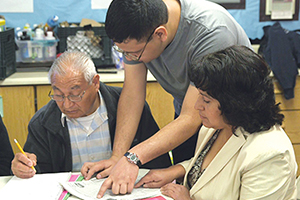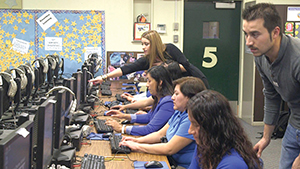By ELLEN FUTTERMAN
Like many universities, this one offers a wide variety of classes, culminates with a graduation ceremony and has its own motto: "Making a difference one parent at a time." Where it differs most, however, is that Napa Valley Parent University, in northern California, enrolls only parents as it strives to help them become more involved in their children's education and welfare.

Joel Tapia Marin, left, and Leonarda Calleros study English as a second language through Napa Valley Parent University in Napa, Calif., with assistance from Ramon Baeza, a Napa Valley Adult Education tutor.
"We found that many immigrant parents really want to help their children with their schoolwork and are eager to volunteer with the local school but just don't know how to access the tools to do so," explained Leslie Medine, senior consultant with On The Move, a nonprofit organization that created Parent University with Queen of the Valley Medical Center in Napa, Calif., part of St. Joseph Health.
"The program helps parents become effective volunteers, school leaders and more involved parents," Medine continued. "We know that the more involved parents are with their children's education, the better chance their children have to succeed."
Begun in 2009, Parent University is now located at six of the 18 public elementary schools in Napa County, all of which receive federal Title 1 funds for schools with large numbers of low-income families, as well as at three Napa Valley preschools. The program also has spread to schools in neighboring counties. (See sidebar.)
Parent University serves more than 1,600 parents each school year and offers 80-plus classes bilingually, in Spanish and English, both during the day and at night. Classes include English as a second language, math games, effective parenting techniques, stress management, nutrition and mental health.
Parents are encouraged to take as many classes as they can — those who take more than 20 credits (one hour equals one credit) are eligible to participate in an end-of-school-year graduation ceremony, though the university itself is not accredited. All classes are offered free of charge, and child care is provided.
Parents as leaders
Dana Codron, executive director of community outreach at Queen of the Valley, points out that the immigrant community in Napa County has grown in recent years, with the Latino population in particular tripling between 1990 and 2010. More than 50 percent of the students in the Napa Valley Unified School District are Hispanic or Latino.
"Many in this community have lower than average annual household incomes and education levels," said Codron. "These parents tend to be less likely to go to parent-teacher conferences, attend their child's school events, volunteer at school functions and support learning at home." She added that while Parent University is open to all parents in the community, it targets low-income, immigrant parents whose language and cultural differences may make them hesitant to engage with their children's school.

With Assistant Instructor Heriberto Magdaleno and Instructor Lupita Melgoza looking over their shoulders, Rosa Muñoz, Nancy Castillo and Josefina Hernández (seated from near to far), learn basic computer skills in a Parent University class at Phillips Elementary School in Napa, Calif., where their children attend school.
Matt Manning is principal at Phillips Elementary School in Napa, which houses one of the Parent University campuses. Before the program began at Phillips, "We had very few immigrant Latino parents in any leadership roles at our school. We wanted to open the doors and encourage these parents to have more of a voice in our school," Manning said.
"We knew we needed that additional leadership, and that is where Parent University has been so successful. We now have many immigrant families where the moms and dad are in leadership roles in our school. Our parent-faculty club president is a graduate of Parent University.
"I can't overstate how much of a huge transformation this program has made in swinging the doors wide open for our Latino families."
Building on inclinations
Overseeing day-to-day operations at Parent University are two co-coordinators, with a site coordinator at each school. Administrators and teachers at each campus teach the classes, along with health professionals from Queen of the Valley and graduates of the program. Most volunteer their time, though some may receive a small stipend.
"We focus a lot on parent leadership development," said Maria Ruiz, one of the co-coordinators. "We identify parents who have the potential to be leaders, though they may not know how, and then provide them with training and coaching so that they can eventually teach classes."
One such parent is Maria de Lourdes Lua Garcia, 35, a stay-at-home mother of three school-age children whose husband, Rafael Garcia Polinar, works in the nearby vineyards. The couple moved to northern California from Michoacan, Mexico, in 2002.
"I got involved because I want my children to feel more supported, plus I want to be able to help them with their schoolwork," said Lua Garcia, who is a graduate of Parent University and continues to take classes there. Although she says her English is improving, she asked Ruiz to serve as translator during an interview.
Lua Garcia said she loves going on field trips with her children's classes as well as participating in "Chips and Chapters," a Parent University class that allows parents to spend time in their children's classroom reading to them as well as learn strategies to improve their child's reading.
"If the program didn't exist I know I wouldn't be as involved as I am," she said. "I feel these classes have also provided me a chance to connect with other parents at school and with my children's teachers. And I think my kids are proud of me for being so involved at their schools. They are very excited when they see me on campus."
Building blocks
Ruiz said the main challenge as new campuses have been launched is getting parents to sign up for classes. "Transportation also is another big issue," she said, "and getting more dads involved.
"Last year we really targeted the dads for specific classes and provided activities where they could do hands-on projects, like building bookcases, with their kids," she continued. "That proved very successful.
"As long as we have classes where they can directly interact with their kids, they will come out."
Medine said the program costs roughly $25,000 per school site. Much of the funding comes from Queen of the Valley's community outreach department and St. Joseph Health's Community Partnership Fund as well as from grants and individual donors.
"By addressing the social and economic issues that impact health, the program is very much in alignment with St. Joseph Health's values of dignity and justice," said Codron.
"An academic achievement gap was identified a number of years ago between our Latino and white students. This program really helps to address that community need, and ultimately helps to improve the health and quality of life of people in the communities we serve."
| Parent University program easily adapts to school's demographic Leslie Medine has helped launch many community-based programs in her 40 years of working for nonprofit organizations. But Napa Valley Parent University is the first such program to prove easily replicable in — and relevant to — so many other communities in Northern California. In fact, Medine, a senior consultant with On The Move, a nonprofit organization that created Parent University with Queen of the Valley Medical Center in Napa, Calif., says the program could easily be adapted to meet the needs of any population where language and cultural differences may be a barrier to parent involvement in schools. Parent University offers dozens of classes to help Latinos overcome hesitation and become more involved parents and leaders at their children's school. "Parents will come out for anything that has to do with their children, whether the parent is Latino or African-American or any other," says Medine. She says the program is "adaptable to any community." Medine says it is important to use peers as trainers. At Parent University venues, the co-coordinators overseeing the program, as well as the site coordinators at each school campus where the classes take place, are all Latino. "You can build trust because there is another parent who looks like you taking charge," she says. "Also, because some of the parents teaching classes went through the classes themselves, there is this sense that if he or she can do it, I can do it. It's an attainable goal." Other factors Medine says are crucial to successfully replicating Napa Valley Parent University are: - Support from the school's principal, who must see parent education and parent engagement as vital
- Day and night classes to accommodate working parents
- Free child care
Medine says also important is that the program be free and supported by several community partners. In the case of Napa Valley Parent University, Queen of the Valley's parent, St. Joseph Health, provides much of the funding. — ELLEN FUTTERMAN |
Copyright © 2015 by the Catholic Health Association
of the United States
For reprint permission, contact Betty Crosby or call (314) 253-3477.